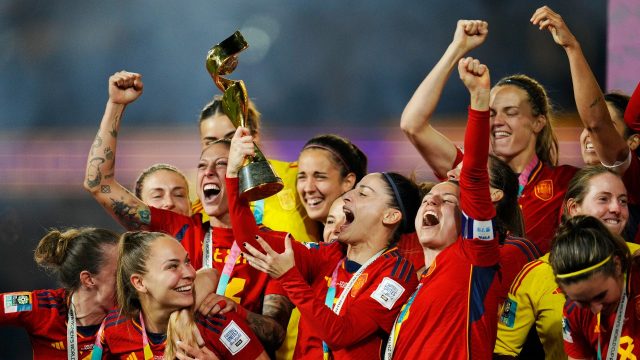
It took the Spanish women’s team more than a year, but it finally gained its revenge against its English counterparts on one of the biggest stages in world sports.
La Roja edged the Lionesses 1-0 in Sunday’s FIFA Women’s World Cup final before 75,784 fans in Sydney, washing out from their mouth the bitter taste of a quarterfinal loss to England at last summer’s European Championship.
Both nations were competing in their first Women’s World Cup final, but it was Spain who came out on top courtesy of Olga Carmona’s goal just before the half-hour mark.
By virtue of this victory, Spain became the first nation to win both a women’s and men’s World Cup — the men turned the trick in South Africa in 2010. For England, the wait for a second World Cup title continues on with seemingly no end in sight — the men hoisted the World Cup trophy on home soil in 1966.
THE RESULT
Final: Spain 1, England 0 (in Sydney) — Game stats || Report
MAIN TALKING POINTS
Spain wins World Cup amid open rebellion
Billed as a match between two technically proficient teams, it was Spain who carried the bulk of Sunday’s game thanks to their possession-based game, their ability to stifle England in midfield and win the ball back so quickly, and a stalwart defence that limited the Lionesses to three shots on target (only one of which tested goalkeeper Cata Coll).
Manager Jorge Vilda made one bold lineup change, giving a start to teenaged winger Salma Paralluelo, voted the young player of the tournament, for two-time Ballon d’Or winner Alexia Putellas, who looked far from her best at this World Cup as she is still recovering from an ACL injury.
But it was fullback Olga Carmona’s goal in the 29th minute that provided all of the offensive production the Spanish needed on the night. At the same time, tournament MVP Aitana Bonmatí marshalled a midfield unit that outfought, outworked and outwitted their English counterparts on the day, starving them out for most of the game by forcing them to feed off table scraps.
For all of Spain’s domination, though, they couldn’t find a way to add a second goal, and when goalkeeper Mary Earps saved Jennifer Hermoso’s penalty in the 68th minute, England was given a lifeline and began to find some attacking joy. The Lionesses threw everything they had at Spain right until the end, including 13 minutes of injury time. But the Spanish resistance proved to be too much for the English to overcome, and La Roja saw things out to deservedly claim their first Women’s World Cup title.
The steely resolve displayed by the Spanish team throughout this tournament and in the final is all the more impressive considering its backstory. Controversy has enveloped La Roja since last September when 15 players sent a letter to the Spanish FA saying they would not play for the team as long as Vilda remained in charge. The players questioned his training methods and tactical standards, and they also had complaints about his behaviour toward them. The Spanish FA backed Vilda and while some players returned to the team, the majority of them did not.
There were visible signs of the strained relationship throughout this World Cup as players routinely snubbed Vilda, while the Spanish coach refused to answer questions about the dispute at his final press conference before the final.
What will be interesting to see is if the Spanish FA continues to back Vilda (assuming he decides not to step down and pursue other options) or whether the players now have the necessary leverage and power as World Cup champions to force him out.
An unforgettable tournament
A FIFA Women’s World Cup to remember drew to a climatic close courtesy of an entertaining final between two first-time finalists who have emerged as rising powers in the women’s game over the last 10 years.
It was a fitting end to a tournament that produced plenty of surprises. Who could’ve predicted Germany, ranked No. 2 in the world, would’ve bowed out in the group stage? Or that Olympic champions Canada and South American powerhouse Brazil would be unable to advance to the knockout round? Or that the United States, the two-time defending champions, would fail to make it to the semifinals for the first time in history?
On the other side of things, there were plenty of great stories about teams who emerged from the shadows. For the first time in the tournament’s history, three African nations made it to the knockout round, including World Cup debutantes Morocco.
Jamaica also advanced to the group stage for the first time, surviving an ultra-competitive group that included France and Brazil. It was an incredible achievement for a Jamaican team that relied in part on a GoFundMe campaign to help pay for their trip to Australia and New Zealand.
Haiti, Republic of Ireland, Panama, Philippines, Portugal, Vietnam and Zambia all impressed in their World Cup debuts and showed they belong, even though they didn’t make it out of the group stage.
The makeup of the quarterfinalists was another positive sign that the gap is closing and that the women’s game is no longer dominated by a small handful of teams. Only five of the eight nations were from Europe — in 2019, it was seven out of eight, with the U.S. being the lone non-European team. Of the remaining eight teams at this tournament, only Japan had previously won the World Cup.
Fears over the expansion of the Women’s World Cup from 24 to 32 nations would lead to a watered-down tournament proved to be totally unfounded. There were few blowouts, and the overall competitiveness of the competition highlighted the tremendous growth that the women’s game has enjoyed around the world.
MOMENT OF THE DAY
After England’s Lucy Bronze lost possession in the centre of the field, Spain quickly launched a counterattack in the 29th minute. The ball eventually found its way down the left side to Mariona Caldentey, who played a smart pass into the penalty area for the overlapping Olga Carmona. The Spanish left full back made no mistake, hitting a low shot across the box that beat England goalkeeper Mary Earps just inside the far post.
PHOTO OF THE DAY
The Spanish women’s team hoists the FIFA World Cup for the first time in its history:
QUOTE OF THE DAY
“England are a great team, but this was for us. We knew what we were going to achieve. I’m speechless.” — Spain’s Olga Carmona.
THREE STARS OF THE DAY
1. Olga Carmona, Spain: Another outstanding performance from the Real Madrid left fullback, who scored the game’s lone goal to lift Spain to its first Women’s World Cup title.
2. Aitana Bonmatí, Spain: The Barcelona midfielder was absolutely sublime for the Spanish side, dictating the pace of the match with her immaculate distribution and solid defensive play.
3. Mary Earps, England: The Manchester United goalkeeper made five saves, including stopping Jennifer Hermoso’s penalty in the 69th minute to keep her team in the game.
John Molinaro is one of the leading soccer journalists in Canada, having covered the game for over 20 years for several media outlets, including Sportsnet, CBC Sports and Sun Media. He is currently the editor-in-chief of TFC Republic, a website dedicated to in-depth coverage of Toronto FC and Canadian soccer. TFC Republic can be found here.






